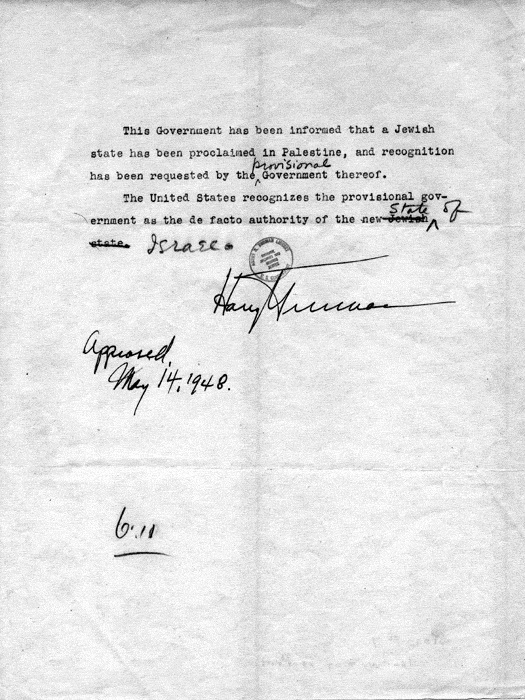So Harry Truman Wasn’t So Big on Israel, After All
via LobeLog
by Jim Lobe
John Judis, whom I consider a truly outstanding journalist, has written a very important book which he previewed in an article posted Wednesday on The New Republic. The article, “Seeds of Doubt: Harry Truman’s concerns about Israel and Palestine were prescient — and forgotten,” argues that a mythology about “Give ‘Em Hell Harry” and his attachment to Israel and the Jewish people has grown steadily over the years for which there is really very little historical basis:
Truman’s reputed devotion to Israel has become the standard by which subsequent president’s commitment is measured. In 1982, Richard Nixon described Ronald Reagan as the “most pro-Israel president since Truman.” A Boston Globe editorial in 1998 described Bill Clinton as “the most pro-Israel president since Harry Truman.” In 2009, Charles Krauthammer described George W. Bush as “the most pro-Israel president since Harry Truman.” And Vice President Joseph Biden declared in 2012 that “no president since Harry Truman has done more for Israel’s security than Barack Obama.”
While it is true, according to Judis, that Truman was content to cast himself as a consistent advocate of Israel after he left office, he expressed considerable skepticism about the wisdom of Israel’s creation and particularly about the actual impacts and implications of its realization while serving in the White House. Indeed “[t]he rosy portrayal of Truman’s unquestioning commitment to and constant sympathy with Israel, which is often linked to a picture of the younger Truman as a Christian Zionist, is dead wrong,” according to Judis. Moreover, Truman appears, in Judis’ telling, to have felt considerable resentment about the pressure exerted on him by Zionist Jews in the US. In any event, the picture set forth in Judis’s article is quite the contrary to the conventional view and deserves to be read in full.
 By coincidence, I happened to visit the Truman Library in Independence, Missouri, last summer when my son was playing in a national soccer tournament nearby in Overland Park, Kansas. The Library is truly quite interesting, not only because of the material collected, but also because it doesn’t pull many punches about the controversies provoked by some of Truman’s more momentous decision, such as the atomic bombing of Hiroshima and Nagasaki. But one document, in particular, drew my attention in the short time I was able to visit the Library, particularly in light of Netanyahu’s current demand that Palestinians recognize Israel as “Jewish state,” a demand to which Secretary of State John Kerry has appeared to acquiesce, much to the great frustration of Palestinian Authority President Mahmoud Abbas, who has insisted that he will never do so.
By coincidence, I happened to visit the Truman Library in Independence, Missouri, last summer when my son was playing in a national soccer tournament nearby in Overland Park, Kansas. The Library is truly quite interesting, not only because of the material collected, but also because it doesn’t pull many punches about the controversies provoked by some of Truman’s more momentous decision, such as the atomic bombing of Hiroshima and Nagasaki. But one document, in particular, drew my attention in the short time I was able to visit the Library, particularly in light of Netanyahu’s current demand that Palestinians recognize Israel as “Jewish state,” a demand to which Secretary of State John Kerry has appeared to acquiesce, much to the great frustration of Palestinian Authority President Mahmoud Abbas, who has insisted that he will never do so.
The document pictured here, which you can click on for a larger image, is the one that caught my attention. It constitutes the May 14, 1948, statement made by Truman granting US recognition of Israel. The interlineations are his writing, and you will see how ambiguously he dealt with the question of Israel as a “Jewish state.”
I don’t have the expertise to voice an informed opinion as to whether or not these interlineations were made for reasons of substance — an implicit questioning or even rejection of Israel as a “Jewish state” (the passive voice of the first sentence and the excision of “Jewish state in the second) — or for stylistic reasons (too much repetition of “Jewish state” within two sentences). But, given the background provided by Judis, I lean to the former rather than the latter. That the Obama administration would accept the characterization of Israel as a “Jewish state” 65 years later offers one more indication of how far US policy has traveled over that time.
En Español
The Latest
 From IPS News
From IPS News- Small Island States Fostering Effective Energy Transition To Achieve a Blue Economy
- Attacks on UNRWA Not About Its Neutrality, Says UNRWA Chief
- US Foreign Policy in Middle East Still Governed by Israeli Priorities
- Rich Nation Hypocrisy Accelerating Global Heating
- Seeking Justice for the Civilian Victims of the Syrian Civil War
- Who Should be the Next UN Leader?PART 7 FINAL
- Will a Two-State Solution include Palestine as a UN Member State?
- UN Live’s CEO Katja Iversen Talks About the Power of Popular Culture and ‘Sounds Right’
- Afghan Women’s Voices Stifled as Taliban Tightens Media Controls
- ‘Toasting the World’s Most Natural Talent’: UN Museum Campaign Recognizes NATURE’s Contributions to Music
- Online fundraising for IPS Inter Press Service at Razoo













